2009-2011年全国卷高考英语听力原文
【听力】2009全国卷I 原文
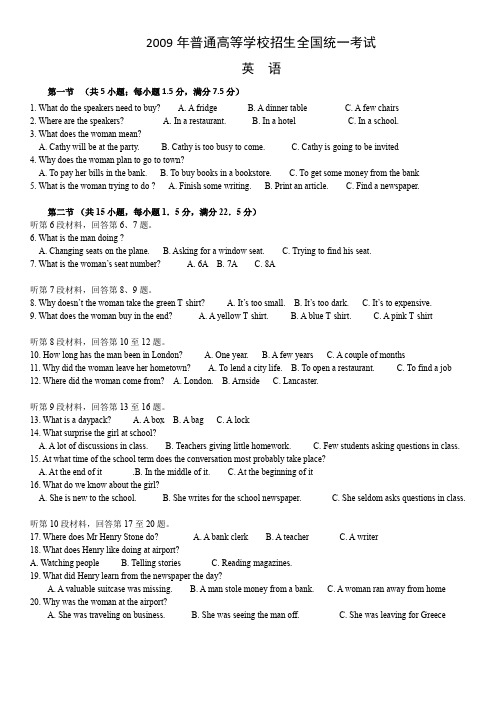
2009年普通高等学校招生全国统一考试英语第一节(共5小题;每小题1.5分,满分7.5分)1. What do the speakers need to buy? A. A fridge B. A dinner table C. A few chairs2. Where are the speakers? A. In a restaurant. B. In a hotel C. In a school.3. What does the woman mean?A. Cathy will be at the party.B. Cathy is too busy to come.C. Cathy is going to be invited4. Why does the woman plan to go to town?A. To pay her bills in the bank.B. To buy books in a bookstore.C. To get some money from the bank5. What is the woman trying to do ? A. Finish some writing. B. Print an article. C. Find a newspaper.第二节(共15小题,每小题1.5分,满分22.5分)听第6段材料,回答第6、7题。
6. What is the man doing ?A. Changing seats on the plane.B. Asking for a window seat.C. Trying to find his seat.7. What is the woman’s seat number? A. 6A B. 7A C. 8A听第7段材料,回答第8、9题。
8. Why doesn’t the woman take the green T-shirt? A. It’s too small. B. It’s too dark. C. It’s to expensive.9. What does the woman buy in the end? A. A yellow T-shirt. B. A blue T-shirt. C. A pink T-shirt听第8段材料,回答第10至12题。
2009年高考英语试卷听力+原文+答案(全国卷Ⅰ、Ⅱ)

2009年全国统一高考英语试卷(全国卷I)听力试题第一部分听力(共两节,满分30分)做题时,先将答案标在试卷上,录音结束后,你将有两分钟的时间将试卷上的答案转涂到答题卡上。
第一节(共5小题,每小题1.5分,满分7.5分)听下面5段对话。
每段对话后有一个小题,从题中所给的A、B、C三个选项中选出最佳答案。
听完每段对话后,你都有10秒钟的时间来回答有关小题和阅读下一小题。
每段对话仅读一遍。
例: How much is the shirt?A. £ 19.15.B. £9.18.C. £9.15.答案是C.1. What do the speakers need to buy?A. A fridge.B. A dinner table.C. A few chairs.2. Where are the speakers?A. In a restaurant.B. In a hotel.C. In a school.3. What does the woman mean?A. Cathy will be at the party.B. Cathy is too busy to come.C. Cathy is going to be invited.4. Why does the woman plan to go to town?A. To pay her bills in the bank.B. To buy books in a bookstore.C. To get some money from the bank.5. What is the woman trying to do?A. Finish some writing.B. Print an article.C. Find a newspaper.第二节(共15小题,每小题1.5分,满分22.5分)听下面5段对话或独白。
2009高考英语听力全国卷1试题听力原文答案
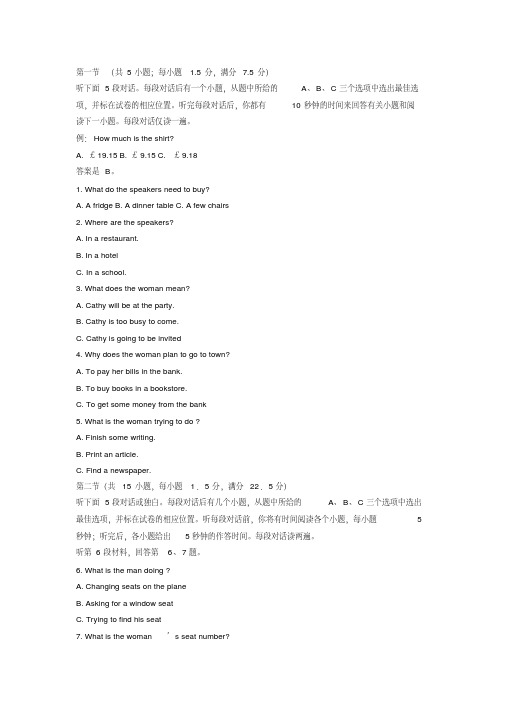
第一节(共5小题;每小题 1.5分,满分7.5分)听下面5段对话。
每段对话后有一个小题,从题中所给的A、B、C三个选项中选出最佳选项,并标在试卷的相应位置。
听完每段对话后,你都有10秒钟的时间来回答有关小题和阅读下一小题。
每段对话仅读一遍。
例:How much is the shirt?A. £19.15B.£9.15C. £9.18答案是B。
1. What do the speakers need to buy?A. A fridgeB. A dinner tableC. A few chairs2. Where are the speakers?A. In a restaurant.B. In a hotelC. In a school.3. What does the woman mean?A. Cathy will be at the party.B. Cathy is too busy to come.C. Cathy is going to be invited4. Why does the woman plan to go to town?A. To pay her bills in the bank.B. To buy books in a bookstore.C. To get some money from the bank5. What is the woman trying to do ?A. Finish some writing.B. Print an article.C. Find a newspaper.第二节(共15小题,每小题1.5分,满分22.5分)听下面5段对话或独白。
每段对话后有几个小题,从题中所给的A、B、C三个选项中选出最佳选项,并标在试卷的相应位置。
听每段对话前,你将有时间阅读各个小题,每小题5秒钟;听完后,各小题给出5秒钟的作答时间。
每段对话读两遍。
2009年高考英语听力(全国卷1)
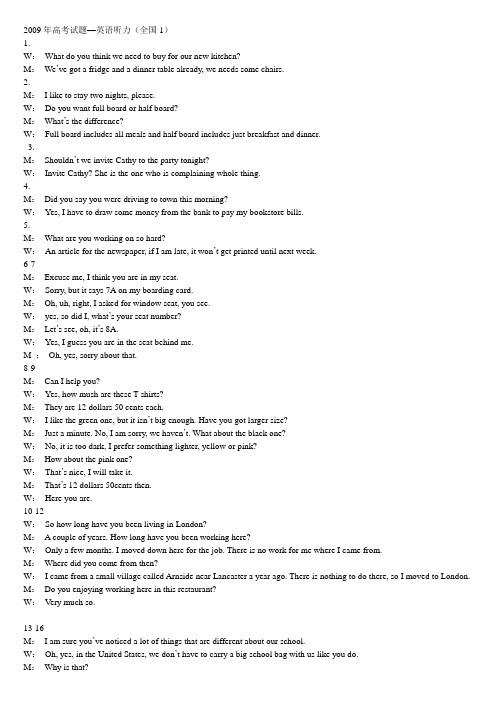
2009年高考试题—英语听力(全国1)1.W:What do you think we need to buy for our new kitchen?M:We’ve got a fridge and a dinner table already, we needs some chairs.2.M:I like to stay two nights, please.W:Do you want full board or half board?M:What’s the difference?W:Full board includes all meals and half board includes just breakfast and dinner.3.M:Shouldn’t we invite Cathy to the party tonight?W:Invite Cathy? She is the one who is complaining whole thing.4.M:Did you say you were driving to town this morning?W:Yes, I have to draw some money from the bank to pay my bookstore bills.5.M:What are you working on so hard?W:An article for the newspaper, if I am late, it won’t get printed until next week.6-7M:Excuse me, I think you are in my seat.W:Sorry, but it says 7A on my boarding card.M:Oh, uh, right, I asked for window seat, you see.W:yes, so did I, what’s your seat number?M:Let’s see, oh, it’s 8A.W:Yes, I guess you are in the seat behind me.M :Oh, yes, sorry about that.8-9M:Can I help you?W:Yes, how mush are these T-shirts?M:They are 12 dollars 50 cents each.W:I like the green one, but it isn’t big enough. Have you got larger size?M:Just a minute. No, I am sorry, we haven’t. What about the black one?W:No, it is too dark, I prefer something lighter, yellow or pink?M:How about the pink one?W:That’s nice, I will take it.M:That’s 12 dollars 50cents then.W:Here you are.10-12W:So how long have you been living in London?M:A couple of years. How long have you been working here?W:Only a few months. I moved down here for the job. There is no work for me where I came from.M:Where did you come from then?W:I came from a small village called Arnside near Lancaster a year ago. There is nothing to do there, so I moved to London. M:Do you enjoying working here in this restaurant?W:Very much so.13-16M:I am sure you’ve noticed a lot of things that are different about our school.W:Oh, yes, in the United States, we don’t have to carry a big school bag with us like you do.M:Why is that?W:We have a locker of our own which is a small box with a lock within textbooks and our personal things in it. I just bring a day pack to school.M:A day pack?W:Yes, it is a small bag which you carry on your back.M:What do you carry in it?W:My notebooks, or a few books for homework.M:That’s convenient. Is there anything else you’ve noticed about our school?W:Yes, I am surprised that everyone is so silent in class.M:What do you mean?W:Well, we usually ask questions about exams, homework or textbooks on the first day of the school year. The teachers like such questions.M:So you thought it different.W:Yes, I expected to see a lot of discussions in class, because we learned that way in the United States.M:I see, that would be a good topic for our school newspaper for the fist month of the term. Nice talking with you. See you around. Bye.W:Bye.17-20W:Good morning, everybody. Today for our writing class, we are glad to have Mr. Henry Stone with us. A well know writer in this country, he is going to share with us his writing experiences. Now, Henry, please tell us how you find so many interesting things for your stories.M:Ok, I watch people a lot, I do that when I travel, I have been to many countries such as Britain, Italy, and Sweden. So I spent a lot of time at the airports, while waiting for my flights, I watch people passing by and start my imagination. For example, the other day when I was waiting for my flight to Greece, I saw a couple, they were buying magazines at that moment, they were not wearing business clothes, but the man was carrying a suitcase, every few seconds, the women looked around, I wondered someone was following them. Perhaps they were running away and, you know, this reminded me of a story in the newspaper that day:a banker stole one million ponds a week before and disappeared with his wife, there was a picture of them in the paper, the couple really looked like the thieves, maybe I should stop them. Just then, I saw them say goodbye to each other. And the women walked away. Well, sometimes I make mistakes like that, but I find things like that very useful for my writing,。
2011年高考英语全国卷I听力录音稿
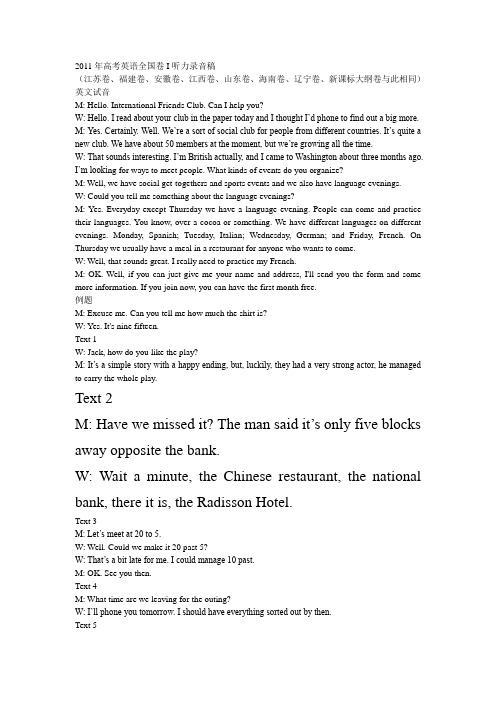
2011年高考英语全国卷I听力录音稿(江苏卷、福建卷、安徽卷、江西卷、山东卷、海南卷、辽宁卷、新课标大纲卷与此相同)英文试音M: Hello. International Friends Club. Can I help you?W: Hello. I read about your club in the paper today and I thought I’d phone to find out a big more. M: Yes. Certainly. Well. We’re a sort of social club for people from different countries. It’s quite a new club. We have about 50 members at the moment, but we’re growing all the time.W: That sounds interesting. I’m British actually, and I came to Washington about three months ago. I’m looki ng for ways to meet people. What kinds of events do you organize?M: Well, we have social get-togethers and sports events and we also have language evenings.W: Could you tell me something about the language evenings?M: Yes. Everyday except Thursday we have a language evening. People can come and practice their languages. You know, over a cocoa or something. We have different languages on different evenings. Monday, Spanish; Tuesday, Italian; Wednesday, German; and Friday, French. On Thursday we usually have a meal in a restaurant for anyone who wants to come.W: Well, that sounds great. I really need to practice my French.M: OK. Well, if you can just give me your name and address, I'll send you the form and some more information. If you join now, you can have the first month free.例题M: Excuse me. Can you tell me how much the shirt is?W: Yes. It's nine fifteen.Text 1W: Jack, how do you like the play?M: It’s a simple story with a happy ending, but, luckily, they had a very strong actor, he managed to carry the whole play.Text 2M: Have we missed it? The man said it’s only five blocks away opposite the bank.W: Wait a minute, the Chinese restaurant, the national bank, there it is, the Radisson Hotel.Text 3M: Let’s meet at 20 to 5.W: Well. Could we make it 20 past 5?W: That’s a bit late for me. I could manage 10 past.M: OK. See you then.Text 4M: What time are we leaving for the outing?W: I’ll phone you tomorrow. I should have everything sorted out by then.Text 5W: Thanks for all you’ve done for m e. Hey, listen, would you like to go to see a film sometime? M: Yeah, that’d be great. I’d love it.Text 6W: Hey, where is everybody?M: They took Ben to the park. Where have you been?W: Sorry, I’m late. I picked up the cake and it took me longer than I expected. When will the party start?M: Ben invited eight children from school. And they’ll arrive at about 2 in the afternoon.W: OK. Then I’ll put the candles on the cake and leave it in the kitchen and then I’ll come and help set the table.Text 7M: So, Macy, how was your holiday?W: Oh, we loved it. Tom liked Germany best, but France was my favorite.M: So did Rachael finally go with you?W: No, she wasn’t able to. She was called away for a business trip to China.M: That’s a pity. So where exactly did you go and visit?W: Well, we traveled all over, Italy, Spain and Holland; we even bathed in a Swiss lakeM: You did, really?Text 8W: Bob, I’m sure you know about second-hand smoke.M: Of course, I do.W: But have you heard about third-hand smoke?M: Third-hand smoke? I’m afraid not. What is that then?W: Well, it is here in today’s paper. Parents may think they are protecting children from second-hand smoke when they smoke outside their home or only when the children are not there. But now researchers are warning about what they call third-hand smoke. When you smoke dangerous matter from cigarettes get into your hair and clothing. As babies are the weakest, when you come to a baby, you pass it to the baby and increase the chances of disease in the baby.M: Is that so? In that case I have to say that I should never get close to a baby.W: That’s right. Actually all smoking parents should do the same or better give it up completely. Text 9M: Hello, welcome to our program “Today City”. I’m Larry. We’re goin g to Louisville Kentucky where our guest Michelle Ray comes from. She is proud of her middle-sized city with a small town feel and big city dreams. Now, Michelle, tell us about your city.W: Thank you, Larry. Here is my city. Louisville is my city. The first place I take visitors from out of town is to the Highlands for shopping and night life. When I have delicious Asian food I always go to the Zen Garden which provides wonderful all vegetable dishes.M: Wow, that’s interesting. Many people go for healthy food now.W: You can say that again. If I want to go camping and fishing, I go to the Red River area. For complete quiet I can hide away in my house with a good book from one of our public libraries. M: That all sounds very exciting. I’m sure some of our l isteners will include Louisville in their travel plan for their next holiday. Thank you, Michelle.Text 10M: We are glad to have Dr. Garfield to talk to us today about dreams. Let me start by asking thefirst question. Does everyone dream?W: It appears that everyone does. Mostly when people say that they never dream, what they really mean is that they don’t remember their dreams or they don’t think their dreams are important. The reason behind is that they might have been made fun of with a child when they first reported their dreams or it was so frightening that they just turned off dreaming completely. The other day, someone named Davis came to me and said that he used to be a great dreamer, but suddenly he stopped having dreams. I asked him what it happened. It turned out that his brother died by heart attack and he never expected that such a terrible thing would happen to a young person. Generally, when there was some frightening event and dream about it was too terrible. People prefer not to dream about it. Actually the worst thing you can do is stop dreaming. Because it means that the bad experience would be too painful to even appear in dreams. As long as you dream about it and even the dream is frightening, your mind is working on it. My personal opinion about what dreams do is that they help us deal with our problems. We see certain patterns take place in dreams. When a person is hurt deep inside, when a person is seriously ill or when a person has been really sad, if people turn off their dreams totally, it means they don’t love themselves to even think about it.听力参考答案:CABBA CBACB CAABC CABAC。
2011年高考英语试卷听力+原文+答案(新课标)

2011年全国统一高考英语试卷(新课标)听力试题第一部分听力(共两节,满分30分)做题时,先将答案标在试卷上,录音结束后,你将有两分钟的时间将试卷上的答案转涂到答题卡上。
第一节(共5小题,每小题1.5分,满分7.5分)听下面5段对话。
每段对话后有一个小题,从题中所给的A、B、C三个选项中选出最佳答案。
听完每段对话后,你都有10秒钟的时间来回答有关小题和阅读下一小题。
每段对话仅读一遍。
例: How much is the shirt?A. £ 19.15.B. £9.18.C. £9.15.答案是C.1. What does the man like about the play?A. The story.B. The ending.C. The actor.2. Which place are the speakers trying to find?A. A hotel.B. A bank.C. A restaurant.3. At what time will the two speakers meet?A. 5:20.B. 5:10.C.4:40.4. What will the man do?A. Change the plan.B. Wait for a phone call.C. Sort things out.5. What does the woman want to do?A. See a film with the man.B. Offer the man some help.C. Listen to some great music.第二节(共15小题:每小题1.5分,满分22.5分)听下面5段对话或独白。
每段对话或独白后有几个小题,从题中所给的A、B、C三个选项中选出最佳选项,并标在试卷的相应位置。
听每段对话或独白前,你将有时间阅读各个小题,每小题5秒钟;听完后,个小题将给出5秒钟的作答时间。
2011年英语听力(全国卷Ⅰ)听力原文
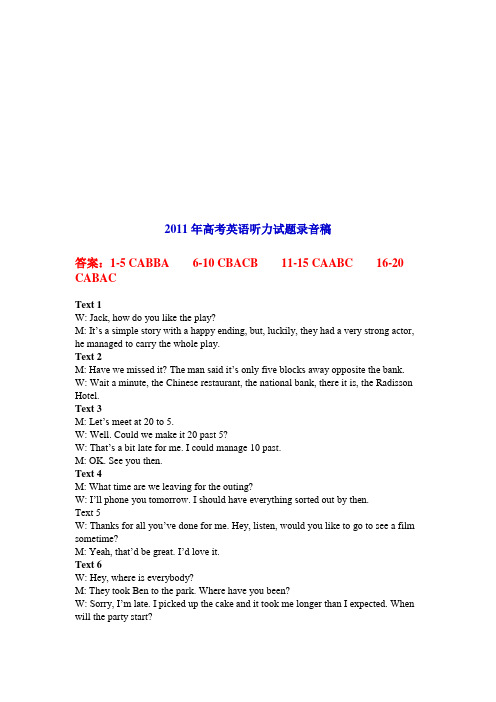
2011年高考英语听力试题录音稿答案:1-5 CABBA 6-10 CBACB 11-15 CAABC 16-20 CABACText 1W: Jack, how do you like the play?M: It’s a simple story with a happy ending, but, luckily, they had a very strong actor, he managed to carry the whole play.Text 2M: Have we missed it? The man said it’s only five blocks away opposite the bank. W: Wait a minute, the Chinese restaurant, the national bank, there it is, the Radisson Hotel.Text 3M: Let’s meet at 20 to 5.W: Well. Could we make it 20 past 5?W: That’s a bit late for me. I could manage 10 past.M: OK. See you then.Text 4M: What time are we leaving for the outing?W: I’ll phone you tomorrow. I should have everything sorted out by then.Text 5W: Thanks for all you’ve done for me. Hey, listen, would you li ke to go to see a film sometime?M: Yeah, that’d be great. I’d love it.Text 6W: Hey, where is everybody?M: They took Ben to the park. Where have you been?W: Sorry, I’m late. I picked up the cake and it took me longer than I expected. When will the party start?M: Ben invited eight children from school. And they’ll arrive at about 2 in the afternoon.W: OK. Then I’ll put the candles on the cake and leave it in the kitchen and then I’ll come and help set the table.Text 7M: So, Macy, how was your holiday?W: Oh, we loved it. Tom liked Germany best, but France was my favorite.M: So did Rachael finally go with you?W: No, she wasn’t able to. She was called away for a business trip to China.M: That’s a pity. So where exactly did you go and visit?W: Well, we traveled all over, Italy, Spain and Holland; we even bathed in a Swiss lakeM: You did, really?Text 8W: Bob, I’m sure you know about second-hand smoke.M: Of course, I do.W: But have you heard about third-hand smoke?M: Third-hand smoke? I’m afraid n ot. What is that then?W: Well, it is here in today’s paper. Parents may think they are protecting children from second-hand smoke when they smoke outside their home or only when the children are not there. But now researchers are warning about what they callthird-hand smoke. When you smoke dangerous matter from cigarettes get into your hair and clothing. As babies are the weakest, when you come to a baby, you pass it to the baby and increase the chances of disease in the baby.M: Is that so? In that case I have to say that I should never get close to a baby.W: That’s right. Actually all smoking parents should do the same or better give it up completely.Text 9M: Hello, welcome to our program “Today City”. I’m Larry. We’re going to Louisville Kentucky where our guest Michelle Ray comes from. She is proud of her middle-sized city with a small town feel and big city dreams. Now, Michelle, tell us about your city.W: Thank you, Larry. Here is my city. Louisville is my city. The first place I take visitors from out of town is to the Highlands for shopping and night life. When I have delicious Asian food I always go to the Zen Garden which provides wonderful all vegetable dishes.M: Wow, that’s interesting. Many people go for healthy food now.W: You can say that again. If I want to go camping and fishing, I go to the Red River area. For complete quiet I can hide away in my house with a good book from one of our public libraries.M: That all sounds very exciting. I’m sure some of our listeners will include Louisville in their travel plan for their next holiday. Thank you, Michelle.Text 10M: We are glad to have Dr. Garfield to talk to us today about dreams. Let me start by asking the first question. Does everyone dream?W: It appears that everyone does. Mostly when people say that they never dream, what they really mean is that they don’t remember their dreams or they don’t think their dreams are important. The reason behind is that they might have been made fun of with a child when they first reported their dreams or it was so frightening that they just turned off dreaming completely. The other day, someone named Davis came to me and said that he used to be a great dreamer, but suddenly he stopped having dreams. I asked him what it happened. It turned out that his brother died by heart attack and he never expected that such a terrible thing would happen to a young person. Generally, when there was some frightening event and dream about it was too terrible. People prefer not to dream about it. Actually the worst thing you can do is stop dreaming. Because it means that the bad experience would be too painful to even appear in dreams. As long as you dream about it and even the dream is frightening, your mind is working on it. My personal opinion about what dreams do is that they help us deal with our problems. We see certain patterns take place in dreams. When a person is hurt deep inside, when a person is seriously ill or when a person has been really sad, if people turn off their dreams totally, it means they don’t lo ve themselves to even think about it.。
09—11听力真题

2011年高考试题英语听力原文(全国1)Text 1W: Jack, how do you like the play?M: It’s a simple story with a happy ending, but, luckily, they had a very strong actor, he can manage to carry the whole play.Text 2M: Have we missed it? The man said it’s only five blocks aw ay opposite the bank.W: Wait a minute, the Chinese restaurant, the national bank, there it is, the R hotel.Text 3M: Let’s meet at 20 to 5.W: Well. Could we make it 20 past 5?W: That’s a bit late for me. I could manage 10 past.M: OK. See you then.Text 4M: What time are we leaving for the outing?W: I’ll phone you tomorrow. I should have everything sorted out by then.Text 5W: Thanks for all you’ve done for me. Hey, listen, would you like to go to see a film sometime?M: Yeah, that’d be great. I’d lo ve it.Text 6W: Hey, where is everybody?M: They took Ben to the park. Where have you been?W: Sorry, I’m late. I picked up the cake and it took me longer than I expected. When will the party start?M: Ben invited eight children from school. And they’ll a rrive at about 2 in the afternoon.W: OK. Then I’ll put the candles on the cake and leave it in the kitchen and then I’ll come and help set the table. Text 7M: So, Macy, how was your holiday?W: Oh, we loved it. Tom liked Germany best, but France was my favorite.M: So did Rachael finally go with you?W: No, she wasn’t able to. She was called a way for a business trip to china,M: That’s a pity. So where exactly did you go and visit?W: Well, we traveled all over, Italy, Spain and H; we even bathe in the Swiss lakeM: You did, really?Text 8W: Bob, I’m sure you know about second-hand smoke.M: Of course. I do.W: But have you heard about third-hand smoke?M: Third-hand smoke? I’m afraid not. What is that then?W: Well, it is here in today’s paper. Parents may think they are protecting children from second hand smoke when they smoke outside their home or only when the children are not there. But now researchers are warning about what they call third-hand smoke. When you smoke dangerous matters from cigarettes get into your hair and clothing. As babies are the weakest, when you come to a baby, you pass it to the baby and increase the chances of disease in the baby.M: Is that so. In that case I have to say that I should never get close to a baby.W: That’s rig ht. Actually all smoking parents should do the same or better give it up completely.Text 9M: Hello, welcome to our program “Today City”. I’m Larry. We’re going to Louisville Kentucky where our guest Michelle Ray comes from. She is proud of her middle-sized city with a small town feel and big city dreams. Now, Michelle, tell us about your city.W: Thank you, Larry. Here is my city. Louisville is my city. The first place I take visitors from out of town is toHighland for shopping and night life. When I have delicious Asian food I always go to the Zen Garden which provides wonderful all vegetable dishes.M: Wow, that’s interesting. Many people go for healthy food now.W: You can see that again. If I want to go camping and fishing, I go to the Red River area. For completely quiet I can hide away in my house with a good book from one of our public libraries.M: That all sounds very exciting. I’m sure some of our listeners will include Louisville in their travel plan for their next holiday. Thank you, Michelle.Text 10M: We are glad to have Dr. Garfield to talk to us today about dreams. Let me start by asking the first question. Does everyone dream?W: It appears that everyone does. Mostly when people say that they never dream, what they really mean is that they don’t remember their dreams or they don’t think their dreams are important. The reason behind is that they might have been made fun with their child when they first reported their dreams or it was so frightening that they just turned off dreaming completely. The other day, someone named Davis came to me and said that he used to be a great dreamer, but suddenly he stopped having dreams. I asked him what it happened. It turned out that his brother died by heart attack and he never expected that such a terrible thing would happen to a young person. Generally, when there was some frightening event and dream about it was too terrible. People prefer not to dream about it. Actually the worst thing you can do is stop dreaming. Because it means that the bad experience would be too painful to even appear in dreams. As long as you dream about it and even the dream is frightening, your mind is working on it. My personal opinion about what dreams do is they help us deal with our problems. We say certain pleaders take pleasant dreams. When a person is hurt deep inside, when a person is seriously ill or when a person has been really sad, if people turn off their dreams totally, it means they don’t love themselves to even think about it.2010年各地高考英语听力真题全国1卷第一部分,听力(共两节,满分30分)回答听力部分时,请先将答案标在试卷上,听力部分结束前,你将有两分钟的时间将你的答案转涂到客观答题卡上。
2011全国各地高考英语听力文本
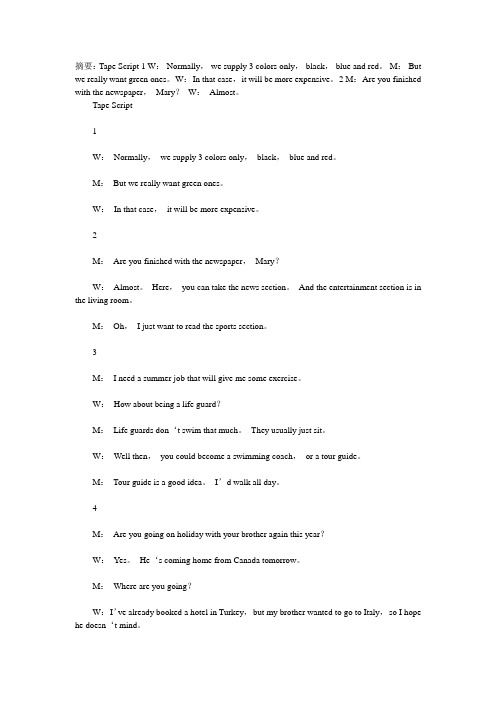
摘要:Tape Script 1 W:Normally,we supply 3 colors only,black,blue and red。
M:But we really want green ones。
W:In that case,it will be more expensive。
2 M:Are you finished with the newspaper,Mary?W:Almost。
Tape Script1W:Normally,we supply 3 colors only,black,blue and red。
M:But we really want green ones。
W:In that case,it will be more expensive。
2M:Are you finished with the newspaper,Mary?W:Almost。
Here,you can take the news section。
And the entertainment section is in the living room。
M:Oh,I just want to read the sports section。
3M:I need a summer job that will give me some exercise。
W:How about being a life guard?M:Life guards don‘t swim that much。
They usually just sit。
W:Well then,you could become a swimming coach,or a tour guide。
M:Tour guide is a good idea。
I’d walk all day。
4M:Are you going on holiday with your brother again this year?W:Yes。
2009年高考英语试卷听力+原文+答案(全国卷Ⅰ、Ⅱ)[001]
![2009年高考英语试卷听力+原文+答案(全国卷Ⅰ、Ⅱ)[001]](https://img.taocdn.com/s3/m/2dd3967369eae009591bec16.png)
2009年全国统一高考英语试卷(全国卷I)听力试题第一部分听力(共两节,满分30分)做题时,先将答案标在试卷上,录音结束后,你将有两分钟的时间将试卷上的答案转涂到答题卡上。
第一节(共5小题,每小题1.5分,满分7.5分)听下面5段对话。
每段对话后有一个小题,从题中所给的A、B、C三个选项中选出最佳答案。
听完每段对话后,你都有10秒钟的时间来回答有关小题和阅读下一小题。
每段对话仅读一遍。
例: How much is the shirt?A. £ 19.15.B. £9.18.C. £9.15.答案是C.1. What do the speakers need to buy?A. A fridge.B. A dinner table.C. A few chairs.2. Where are the speakers?A. In a restaurant.B. In a hotel.C. In a school.3. What does the woman mean?A. Cathy will be at the party.B. Cathy is too busy to come.C. Cathy is going to be invited.4. Why does the woman plan to go to town?A. To pay her bills in the bank.B. To buy books in a bookstore.C. To get some money from the bank.5. What is the woman trying to do?A. Finish some writing.B. Print an article.C. Find a newspaper.第二节(共15小题,每小题1.5分,满分22.5分)听下面5段对话或独白。
2009年高考英语听力-原文-答案

2009年高考试题—英语听力(全国1)第一节Text 1W: What do you think we need to buy for our new kitchenM: We’ve got a fridge and a dinner table already. We need some chairs.Text 2M: I like to stay two nights, please.W: Do you want full board or half boardM: Wha t’s the differenceW: Full board includes all meals, and half board includes just breakfast and dinner. Text 3M: Shouldn’t we invite Cathy to the party tonightW: Invite Cathy She is the one who is planning the whole thing.Text 4M: Did you say you were driving to town this morningW: Yes. I have to draw some money from the bank to pay my bookstore bills.Text 5M: What are you working on so hardW: An article for the newspaper. If I’m late, it won’t get printed until next week. 第二节Text 6M: Excuse me. I think you are in my seat.W: Sorry, but it says 7A on my boarding card.M: Oh, um… right. I asked for a window seat, you see.W: Yeah, so did I. What’s your seat numberM: Let’s see. Oh, it’s 8A.W: So I guess you are in the seat behind me.M: Oh, yes. Sorry about that.Text 7M: Can I help youW: Yes. How much are these T-shirtsM: They are 12 dollars 50 cents each.W: I like the green one, but it isn’t big enough. Have you got a larger sizeM: Just a minute. No, I’m sorry, we haven’t. What about the black oneW: No, it’s too dark. I prefer something lighter, yellow or pink.M: How about the pink oneW: Yes. That’s nice. I’ll take it.M: That’s 12 dollars 50 cents then, please.W: Here you are.Text 8W: So how long have you been living in LondonM: Umm… a couple of years. How long have you been working hereW: Only a few months. I moved down here for the job. There was no work for me where I came from.M: Where did you come from thenW: I came from a small village called Arnside, near Lancaster a year ago. Umm… there was nothing to do there, so I moved to London.M: Do you enjoy working here in this restaurantW: Very much so.Text 9M: I’m sure you’ve noticed a lot of things that are different about our school.W: Oh, yes. In the United States, we don’t have to carry a big school bag with us like you do.M: Why is thatW: We have a locker of our own which is a small box with a lock. We keep textbooks and ourpersonal things in it. I just bring a daypack to school.M: A daypackW: Yes. It’s a small bag that you carry on your back.M: What do you carry in itW: My notebooks or a few books for homework.M: That’s convenient. Is there anything else you’ve noticed about our schoolW: Yes. I am surprised that everyone is so silent in class.M: What do you meanW: Well, we usually ask questions about exams, homework or textbooks on the first day of theschool year. The teacher likes such questions.M: So you felt it differentW: Yes. I expected to see a lot of discussions in class because we learn that way in the UnitedStates.M: I see. That will be a good topic for our school newspaper for the first month of the term. Nice talking with you. See you around. Bye!W: Bye!Text 10W: Good morning, everybody! Today for our writing class, we are glad to have Mr. Henry Stonewith us, a well-known writer in this country. He is going to share with us his writing experiences. Now, Henry, please tell us how you find so many interesting things for your storiesM: Okay. I watch people a lot. I do that when I travel. I’ve been to many countries such asBritain, Italy and Sweden, so I spend a lot of time at airports. While waiting for my flights, Iwatch people passing by and start my imagination. For example, the other day when I was waiting for my flight to Greece, I saw a couple. They were buying magazines at that moment. They were not wearing business clothes but the man was carrying a suitcase. Every few seconds the woman looked around. I wondered if someone was following them. Perhaps they were running away and…. You know, this reminded me of a story in the newspaper that day. Abank clerk stole one million pounds a week before and disappeared with his wife. There was apicture of them in the paper. The couple really looked like the thieves. Maybe I should stopthem. Just then, I saw them say goodbye to each other, and the woman walked away. Well, sometimes I make mistakes like that. But I find things like that very useful答案1-5 CBACA 6-10CBACB11-05CBBCC 16-20ACABB。
2011年高考全国卷英语听力录音整理稿
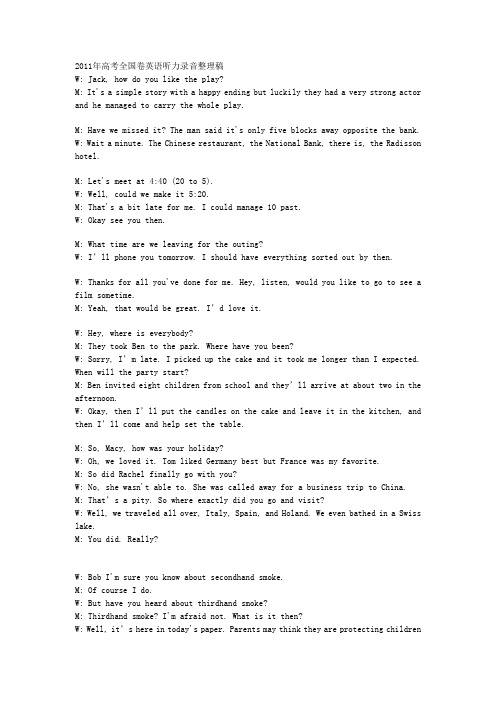
2011年高考全国卷英语听力录音整理稿W: Jack, how do you like the play?M: It's a simple story with a happy ending but luckily they had a very strong actor and he managed to carry the whole play.M: Have we missed it? The man said it's only five blocks away opposite the bank. W: Wait a minute. The Chinese restaurant, the National Bank, there is, the Radisson hotel.M: Let's meet at 4:40 (20 to 5).W: Well, could we make it 5:20.M: That's a bit late for me. I could manage 10 past.W: Okay see you then.M: What time are we leaving for the outing?W: I’ll phone you tomorrow. I should have everything sorted out by then.W: Thanks for all you've done for me. Hey, listen, would you like to go to see a film sometime.M: Yeah, that would be great. I’d love it.W: Hey, where is everybody?M: They took Ben to the park. Where have you been?W: Sorry, I’m late. I picked up the cake and it took me longer than I expected. When will the party start?M: Ben invited eight children from school and they’ll arrive at about two in the afternoon.W: Okay, then I’ll put the candles on the cake and leave it in the kitchen, and then I’ll come and help set the table.M: So, Macy, how was your holiday?W: Oh, we loved it. Tom liked Germany best but France was my favorite.M: So did Rachel finally go with you?W: No, she wasn't able to. She was called away for a business trip to China. M: That’s a pity. So where exactly did you go and visit?W: Well, we traveled all over, Italy, Spain, and Holand. We even bathed in a Swiss lake.M: You did. Really?W: Bob I'm sure you know about secondhand smoke.M: Of course I do.W: But have you heard about thirdhand smoke?M: Thirdhand smoke? I'm afraid not. What is it then?W: Well, it’s here in today's paper. Parents may think they are protecting childrenfrom secondh smoke when they smoke outside their home or only when the children are not there. But now researchers are warnning about what they call thirdhand smoke. When you smoke, dangerous matter from cigarrettes gets into your hair and clothing, and as babies are the weakest when you come to a baby, you pass it to the baby and increase the chances of disease in the baby.M: Is that so? In that case, I have to say that I should never get close to a baby. W: That’s right. Actually all smoking parents should do the same or better give it up completely.M: Hello, welcome to our program Today's City. I’m Larry. We are going to Louisville Kentucky where our guest Michelle Ray comes from. She is proud of her middle sized city with a small-town feel and big city dreams. Now, Michelle tell us about your city.W: Thank you, Larry. Here’s my city. Louisville is my city. The first place I take a visitor from out of town is to the Highlands for shopping and nightlife. When I have delicious Asian food, I always go to the Zen garden which provides wonderful all vegetable dishes.M: Vow, that's interesting. Many people go for healthy food now.W: You can say that again. If I want to go camping and fishing, I go to the Red River area. For complete quiet, I can hide away in my house with a good book from one of our public libraries.M: That all sounds very exciting. I'm sure some of our listeners will include Louisville in their travel plan for their next holiday. Thank you, Michelle.M: We are glad to have Dr. Garfield to talk to us today about dreams. Let me start by asking the first question: does everyone dream?W: It appears that everyone does. Mostly when people say that they never dream, what they really mean is that they don't remember their dreams or they don't think their dreams are important. The reason behind is that they might have been made fun of as a child when they first reported their dreams or it was so frightening that they just turned off dreaming completely. The other day someone named Davis came to me and said that he used to be a great dreamer. But suddenly he stopped having dreams.I asked him what had happened. It turned out that his brother died of a heart attack and he never expected that such a terrible thing would happen to a young person. Generally when there was an frightening event and to dream about it was too terrible, people prefer not to dream about it. Actually the worst thing you can do is stop dreaming because it means that the bad experience was too painful to even appears in dreams. As long as you're dreaming about it and even if the dreams are frightening, your mind is working on it. My personal opinion about what dreams do is that they help us deal with our problems. We see certain patterns take place in dreams when a person is hurt deep inside, when a person is seriously ill or when a person has been really sad. If people turn off their dreams totally, it means they don't allow themselves to even think about it.听力参考答案:1.C2.A3.B4.B5.A6.C7.B8.A9.C 10.B 11.C 12.A 13.A 14.B 15.C 16.C 17.A 18.B 19.A 20.C。
2011年全国统一高考英语试卷听力+原文+答案(新课标)
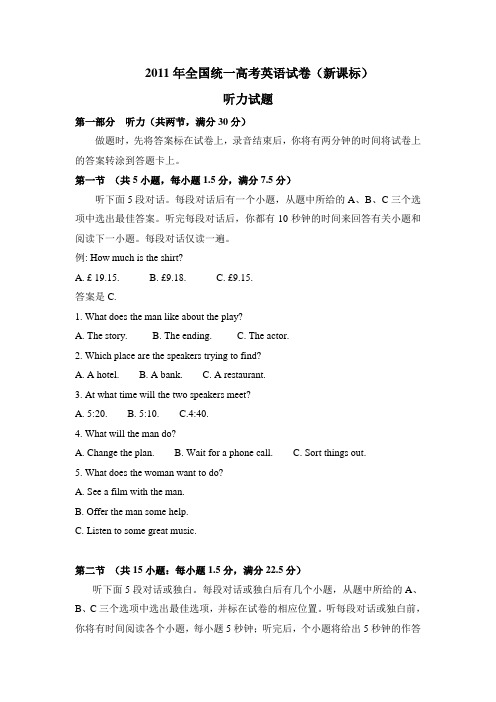
2011年全国统一高考英语试卷(新课标)听力试题第一部分听力(共两节,满分30分)做题时,先将答案标在试卷上,录音结束后,你将有两分钟的时间将试卷上的答案转涂到答题卡上。
第一节(共5小题,每小题1.5分,满分7.5分)听下面5段对话。
每段对话后有一个小题,从题中所给的A、B、C三个选项中选出最佳答案。
听完每段对话后,你都有10秒钟的时间来回答有关小题和阅读下一小题。
每段对话仅读一遍。
例: How much is the shirt?A. £ 19.15.B. £9.18.C. £9.15.答案是C.1. What does the man like about the play?A. The story.B. The ending.C. The actor.2. Which place are the speakers trying to find?A. A hotel.B. A bank.C. A restaurant.3. At what time will the two speakers meet?A. 5:20.B. 5:10.C.4:40.4. What will the man do?A. Change the plan.B. Wait for a phone call.C. Sort things out.5. What does the woman want to do?A. See a film with the man.B. Offer the man some help.C. Listen to some great music.第二节(共15小题:每小题1.5分,满分22.5分)听下面5段对话或独白。
每段对话或独白后有几个小题,从题中所给的A、B、C三个选项中选出最佳选项,并标在试卷的相应位置。
听每段对话或独白前,你将有时间阅读各个小题,每小题5秒钟;听完后,个小题将给出5秒钟的作答时间。
2011年全国统一高考英语试卷听力+原文+答案(新课标)

2011年全国统一高考英语试卷(新课标)听力试题第一部分听力(共两节,满分30分)做题时,先将答案标在试卷上,录音结束后,你将有两分钟的时间将试卷上的答案转涂到答题卡上。
第一节(共5小题,每小题1.5分,满分7.5分)听下面5段对话。
每段对话后有一个小题,从题中所给的A、B、C三个选项中选出最佳答案。
听完每段对话后,你都有10秒钟的时间来回答有关小题和阅读下一小题。
每段对话仅读一遍。
例: How much is the shirt?A. £ 19.15.B. £9.18.C. £9.15.答案是C.1. What does the man like about the play?A. The story.B. The ending.C. The actor.2. Which place are the speakers trying to find?A. A hotel.B. A bank.C. A restaurant.3. At what time will the two speakers meet?A. 5:20.B. 5:10.C.4:40.4. What will the man do?A. Change the plan.B. Wait for a phone call.C. Sort things out.5. What does the woman want to do?A. See a film with the man.B. Offer the man some help.C. Listen to some great music.第二节(共15小题:每小题1.5分,满分22.5分)听下面5段对话或独白。
每段对话或独白后有几个小题,从题中所给的A、B、C三个选项中选出最佳选项,并标在试卷的相应位置。
听每段对话或独白前,你将有时间阅读各个小题,每小题5秒钟;听完后,个小题将给出5秒钟的作答时间。
全国英语高考听力2009年9月份原文答案
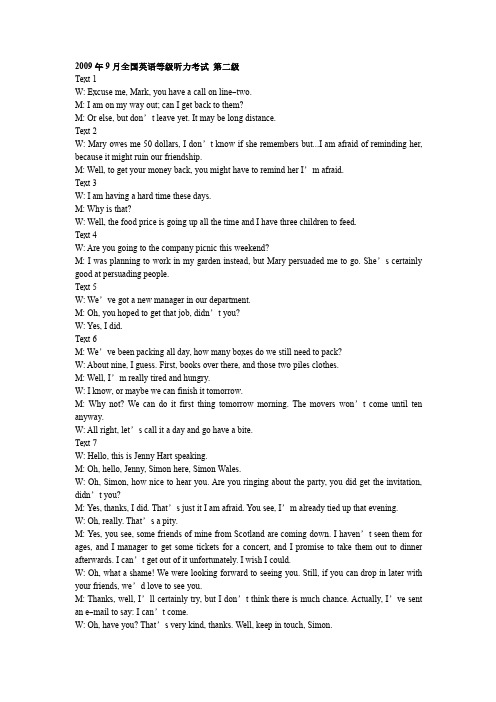
2009年9月全国英语等级听力考试第二级Text1W:Excuse me,Mark,you have a call on line-two.M:I am on my way out;can I get back to them?M:Or else,but don’t leave yet.It may be long distance.Text2W:Mary owes me50dollars,I don’t know if she remembers but...I am afraid of reminding her, because it might ruin our friendship.M:Well,to get your money back,you might have to remind her I’m afraid.Text3W:I am having a hard time these days.M:Why is that?W:Well,the food price is going up all the time and I have three children to feed.Text4W:Are you going to the company picnic this weekend?M:I was planning to work in my garden instead,but Mary persuaded me to go.She’s certainly good at persuading people.Text5W:We’ve got a new manager in our department.M:Oh,you hoped to get that job,didn’t you?W:Yes,I did.Text6M:We’ve been packing all day,how many boxes do we still need to pack?W:About nine,I guess.First,books over there,and those two piles clothes.M:Well,I’m really tired and hungry.W:I know,or maybe we can finish it tomorrow.M:Why not?We can do it first thing tomorrow morning.The movers won’t come until ten anyway.W:All right,let’s call it a day and go have a bite.Text7W:Hello,this is Jenny Hart speaking.M:Oh,hello,Jenny,Simon here,Simon Wales.W:Oh,Simon,how nice to hear you.Are you ringing about the party,you did get the invitation, didn’t you?M:Yes,thanks,I did.That’s just it I am afraid.You see,I’m already tied up that evening. W:Oh,really.That’s a pity.M:Yes,you see,some friends of mine from Scotland are coming down.I haven’t seen them for ages,and I manager to get some tickets for a concert,and I promise to take them out to dinner afterwards.I can’t get out of it unfortunately.I wish I could.W:Oh,what a shame!We were looking forward to seeing you.Still,if you can drop in later with your friends,we’d love to see you.M:Thanks,well,I’ll certainly try,but I don’t think there is much chance.Actually,I’ve sent an e-mail to say:I can’t come.W:Oh,have you?That’s very kind,thanks.Well,keep in touch,Simon.M:I will.Bye.Text8W:When did you have your first car?M:I didn’t have one until I became a doctor.W:What did it look like?M:Well,it was a nice blue Japanese car.W:Was it big?M:Not really,but it was comfortable and gas-saving.W:Are you still driving it?M:No,I sold it two years ago.W:Why?Was it broken?M:I got a job at abroad,and I couldn’t take it with me.W:Are you thinking of driving again?M:Maybe,but this time I’m going to buy an American car.Text9W:Good evening and welcome to this week’s business world.A programme for and about business people.Tonight,we have invited as our guest,Mr.Victor Angerlino.He will give us information about how to start business and keep it going.Mr.Angerlino came to the United States six years ago.And now he is owner and manager of three restaurants in town.Tell us,Mr. Angerlino,how did you get started?M:Well,I started off with a small restaurant down the eastern side of town.I did all the cooking myself,and my wife waited on tables.It was really a lot of work for two people,and we put in a lot of hours.The next thing you know is that the business really got going.Within a year,I had hired another cook and two waitresses.When the restaurant became really very busy,I decided to open another one on the other side of the city.We now have three places,my main job is keeping our business successful and running smoothly.W:How are you doing that?Why do you believe you have been so successful?M:First of all,I always served the freshest possible food.I make the places as comfortable and pleasant as I can,so my customers will want to come back.I try to keep my workers happy in willing to work hard for me.They help make sure the business is successful,you know.W:So you always try to please the customers.M:Certainly,after all,without them,I have no business at all.W:Thank you,Mr.Angelino,your advice will be helpful to those just starting out in business. Text10W:Let me tell you about our worst experience.Back in1982,we went to San Francisco for two weeks.We stayed at Fairmount for most of the trip,and then took a side trip to visit my cousin in Modesto.After our visit,we decided not to sleep at this house,but to find a place on the way back to San Francisco;we drove for a long time,and finally stopped at a motel hotel in the middle of the night.We got to our room to find for TV change to the table,and we had to get the manager to operate the TV for us.After he left,a short time later,there was a knock on the door;it was the manager with a roll of paper.I asked him what was for,and he said that we could use them in the bathroom;we had to take a shower and dry off with the paper.The unused ones had to be brought back to the office;this was quite difficult to accept.We were used to the good service at Fairmount.2009年9月全国英语等级听力考试第二级。
2011全国卷听力题目及原文
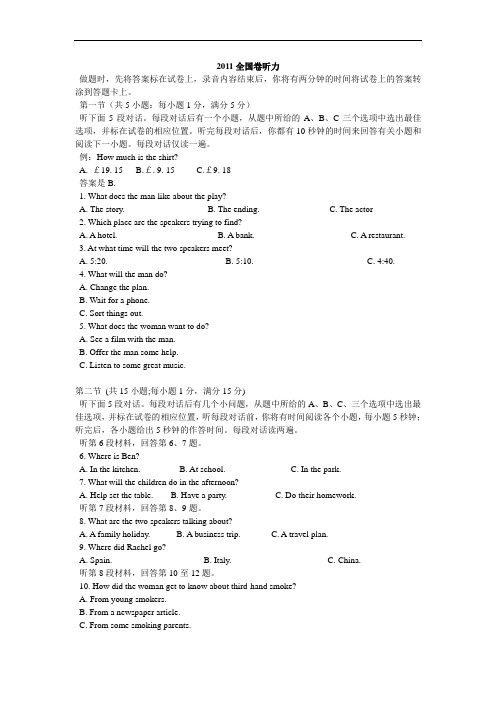
2011全国卷听力做题时,先将答案标在试卷上,录音内容结束后,你将有两分钟的时间将试卷上的答案转涂到答题卡上。
第一节(共5小题:每小题1分,满分5分)听下面5段对话。
每段对话后有一个小题,从题中所给的A、B、C三个选项中选出最佳选项,并标在试卷的相应位置。
听完每段对话后,你都有10秒钟的时间来回答有关小题和阅读下一小题。
每段对话仅读一遍。
例:How much is the shirt?A. £19. 15B.£. 9. 15C.£9. 18答案是B.1. What does the man like about the play?A. The story.B. The ending.C. The actor2. Which place are the speakers trying to find?A. A hotel.B. A bank.C. A restaurant.3. At what time will the two speakers meet?A. 5:20.B. 5:10.C. 4:40.4. What will the man do?A. Change the plan.B. Wait for a phone.C. Sort things out.5. What does the woman want to do?A. See a film with the man.B. Offer the man some help.C. Listen to some great music.第二节(共15小题;每小题1分,满分15分)听下面5段对话。
每段对话后有几个小问题,从题中所给的A、B、C、三个选项中选出最佳选项,并标在试卷的相应位置,听每段对话前,你将有时间阅读各个小题,每小题5秒钟;听完后,各小题给出5秒钟的作答时间。
每段对话读两遍。
听第6段材料,回答第6、7题。
6. Where is Ben?A. In the kitchen.B. At school.C. In the park.7. What will the children do in the afternoon?A. Help set the table.B. Have a party.C. Do their homework.听第7段材料,回答第8、9题。
(完整版)高考真题英语听力原文(全国I卷)

(完整版)高考真题英语听力原文(全国I卷)一、听力原文Section A1. W: Hi, Mike. How was your summer vacation?M: It was great! I spent two weeks in Canada with my family. How about you?W: I stayed at home and worked parttime in a bookstore.2. M: Excuse me, is this the right way to the library?W: Yes, it is. Just go straight and turn left at the end of the road.3. W: I'm sorry, but I can't find my English book anywhere.M: Don't worry. I think you left it in the classroom this morning.4. M: Would you like some coffee, Mrs. Wang?W: No, thanks. I prefer tea.5. W: How much is the shirt?M: It's 200 yuan, but we have a discount of 20% today.Section BConversation 1M: Hi, Lily. Are you going to the movies this evening?W: Yes, I'm going to watch "The Lion King" with my friends.M: That's a great movie! I watched it last week. How are you getting there?W: We'll take the subway. It's convenient and fast.M: OK. Have a good time!Conversation 2W: Excuse me, is this seat taken?M: No, it's free. Please sit down.W: Thank you. The train is so crowded today.M: Yes, it's always like this during the morning rush hour.W: Where are you going?M: I'm going to Beijing. How about you?W: I'm going to Shanghai.Section CPassage 1Last weekend, I went to a farm with my family. It was a beautiful day, and we had a great time. We saw many animals, such as cows, sheep, and chickens. My younger brother was excited to feed the sheep. We also picked some fresh vegetables and fruits. In the afternoon, we had a picnic in the garden. It was a wonderful day, and I hope we can go there again.Passage 2My name is Tom, and I'm a high school student. I have a busy day every day. I get up at 6:30 a.m. and go to school bus. School starts at 8:00 a.m. and finishes at 4:00 p.m. After school, I usually play basketball with my friends. Then I go home and do my homework. In the evening, I read books and go to bed at 10:00 p.m. Although my life is busy, I enjoy it.Passage 3(完整版)高考真题英语听力原文(全国I卷)Section DQuestion 2124Listen to the following news report and choose thecorrect answer.News Report 1A major earthquake struck a remote area in southwestern China yesterday, causing widespread damage. According to the local government, several buildings have collapsed, and many roads are blocked. Rescue teams have been sent to the area to help those affected. The earthquake had a magnitude of 6.5 and was felt in several near provinces. So far, there have been no reports of casualties.21. What is the main topic of the news report?22. Where did the earthquake occur?23. What is the magnitude of the earthquake?24. What is the current situation regarding casualties?Question 2528Listen to the following weather forecast and choose the correct answer.Weather ForecastGood morning, everyone. Here's the weather forecast for the week. Today will be sunny with a high of 28 degrees Celsius. Tomorrow will see some clouds, but it will still be warm with a high of 26 degrees. Wednesday and Thursday will be rainy, so remember to bring your umbrellas. The rain will clear up Friday, and the weekend will be sunny and pleasant.25. What is the weather like today?26. What should people do on Wednesday and Thursday?27. Which day will be rainy?28. How will the weather be during the weekend?Section EQuestion 2932Listen to the following interview and choose the correct answer.InterviewMr. Smith: Thank you for having me.Mr. Smith: Well, I've always been interested inhistorical events. This novel is set during World War II, andI wanted to explore the courage and resilience of ordinary people during that time.Host: That sounds fascinating. How long did it take youto write the book?Host: Any advice for aspiring writers?Mr. Smith: Just keep writing and never give up on your dreams.29. What is Mr. Smith's profession?30. What is the setting of his latest novel?31. How long did it take him to write the book?32. What advice does he give to aspiring writers?Question 3335Listen to the following conversation and choose thecorrect answer.ConversationM: Have you ever been to the National Museum?W: Yes, I went there last month. It's a great place to learn about Chinese history and culture.M: I heard they have a new exhibition on ancient Chinese paintings. Do you know anything about it?W: Yes, the exhibition is called "Masters of the Brush."It features paintings from the Tang, Song, and Yuan dynasties. It's really worth a visit.M: I'll definitely check it out. Thanks for the information!33. What did the woman do last month?34. What is the new exhibition about?35. What does the woman think of the exhibition?(完整版)高考真题英语听力原文(全国I卷)Section FQuestion 3640Listen to the following short talks and choose thecorrect answer.Short Talk 136. What is the main topic of the seminar?38. What is one way to reduce plastic waste mentioned in the talk?Short Talk 240. Which activity is NOT mentioned at the health fair?Section GQuestion 4145Listen to the following longer conversation and choose the correct answer.ConversationW: Hi, John. I heard you're going on a trip to Japan next month. Are you excited?M: Yes, I can't wait! I've always wanted to visit Japan.I'm planning to visit Tokyo, Kyoto, and Osaka.W: That sounds amazing. What are you most looking forward to?M: I'm really excited to try the traditional Japanese cuisine and visit the historical sites in Kyoto.W: Have you started packing yet?M: Not yet. I'm waiting for my travel guidebook to arrive, so I can make a list of things to bring.W: Well, if you need any help or advice, just let me know. I've been to Japan a couple of times.41. Where is John going on his trip?42. Which cities is he planning to visit?43. What is he most excited about in Japan?44. Why hasn't John started packing yet?45. What does the woman offer to help with?。
2011年高考全国卷英语听力试题(含试题、听力音频、听力原文和答案)
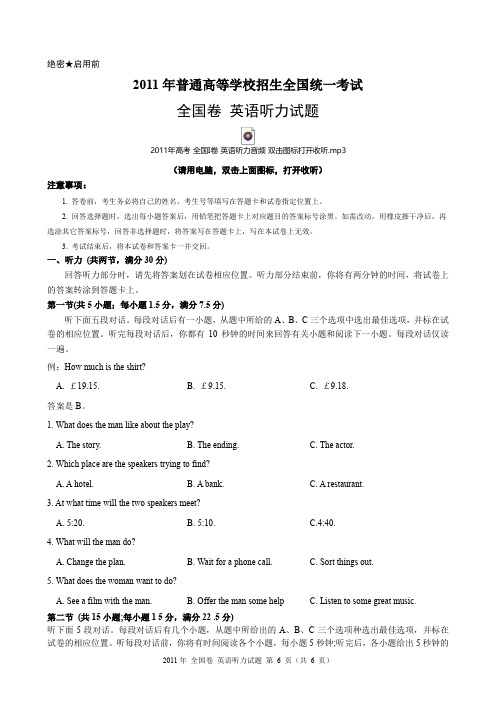
绝密★启用前2011年普通高等学校招生全国统一考试全国卷英语听力试题2011年高考 全国I卷 英语听力音频 双击图标打开收听.mp3(请用电脑,双击上面图标,打开收听)注意事项:1. 答卷前,考生务必将自己的姓名、考生号等填写在答题卡和试卷指定位置上。
2. 回答选择题时,选出每小题答案后,用铅笔把答题卡上对应题目的答案标号涂黑。
如需改动,用橡皮擦干净后,再选涂其它答案标号,回答非选择题时,将答案写在答题卡上,写在本试卷上无效。
3. 考试结束后,将本试卷和答案卡一并交回。
一、听力(共两节,满分30分)回答听力部分时,请先将答案划在试卷相应位置。
听力部分结束前,你将有两分钟的时间,将试卷上的答案转涂到答题卡上。
第一节(共5小题;每小题1.5分,满分7.5分)听下面五段对话。
每段对话后有一小题,从题中所给的A、B、C三个选项中选出最佳选项,并标在试卷的相应位置。
听完每段对话后,你都有10秒钟的时间来回答有关小题和阅读下一小题。
每段对话仅读一遍。
例:How much is the shirt?A. £19.15.B. £9.15.C. £9.18.答案是B。
1. What does the man like about the play?A. The story.B. The ending.C. The actor.2. Which place are the speakers trying to find?A. A hotel.B. A bank.C. A restaurant.3. At what time will the two speakers meet?A. 5:20.B. 5:10.C.4:40.4. What will the man do?A. Change the plan.B. Wait for a phone call.C. Sort things out.5. What does the woman want to do?A. See a film with the man.B. Offer the man some helpC. Listen to some great music.第二节(共15小题;每小题1 5分,满分22 .5分)听下面5段对话。
- 1、下载文档前请自行甄别文档内容的完整性,平台不提供额外的编辑、内容补充、找答案等附加服务。
- 2、"仅部分预览"的文档,不可在线预览部分如存在完整性等问题,可反馈申请退款(可完整预览的文档不适用该条件!)。
- 3、如文档侵犯您的权益,请联系客服反馈,我们会尽快为您处理(人工客服工作时间:9:00-18:30)。
2009年高考试题——英语听力(全国1、福建、江西、海南、宁夏、山东卷)第一节1.W: What do you think we need to buy for our new kitchen?M: We’ve got a fridge and a dinner table already, we needs some chairs.2.M: I like to stay two nights, please.W: Do you want full board or half board?M: What’s the difference?W: Full board includes all meals and half board includes just breakfast and dinner.3.M: Shouldn’t we invi te Cathy to the party tonight?W: Invite Cathy? She is the one who is complaining whole thing.4.M: Did you say you were driving to town this morning?W: Yes, I have to draw some money from the bank to pay my bookstore bills.5.M: What are you working on so hard?W: An article for the newspaper, if I am late, it won’t get printed until next week.第二节6-7M: Excuse me, I think you are in my seat.W: Sorry, but it says 7A on my boarding card.M: Oh, uh, right, I asked for window seat, you see.W: yes, so did I, what’s your seat number?M: Let’s see, oh, it’s 8A.W: Yes, I guess you are in the seat behind me.M : Oh, yes, sorry about that.8-9M: Can I help you?W: Yes, how mush are these T-shirts?M: They are 12 dollars 50 cents each.W: I like the green one, but it isn’t big enough. Have you got larger size?M: Just a minute. No, I am sorry, we haven’t. What about the black one?W: No, it is too dark, I prefer something lighter, yellow or pink?M: How about the pink one?W: That’s nice, I will take it.M: That’s 12 dollars 50cents then.W: Here you are.10-12W: So how long have you been living in London?M: A couple of years. How long have you been working here?W: Only a few months. I moved down here for the job. There is no work for me where I came from.M: Where did you come from then?W: I came from a small village called Arnside near Lancaster a year ago. There is nothing to do there, so I moved to London.M: Do you enjoying working here in this restaurant?W: Very much so.13-16M: I am sure you’ve noticed a lot of things that are different about our school.W: Oh, yes, in the United States, we don’t have to carry a big school bag with us like you do.M: Why is that?W: We have a locker of our own which is a small box with a lock within textbooks and our personal things in it. I just bring a day pack to school.M: A day pack?W: Yes, it is a small bag which you carry on your back.M: What do you carry in it?W: My notebooks, or a few books for homework.M: That’s convenient. Is there anything else you’ve noticed about our school?W: Yes, I am surprised that everyone is so silent in class.M: What do you mean?W: Well, we usually ask questions about exams, homework or textbooks on the first day of the school year. The teachers like such questions.M: So you thought it different.W: Yes, I expected to see a lot of discussions in class, because we learned that way in the United States.M: I see, that would be a good topic for our school newspaper for the fist month of the term. Nice talking with you. See you around. Bye.W: Bye.17-20W: Good morning, everybody. Today for our writing class, we are glad to have Mr. Henry Stone with us. A well know writer in this country, he is going to share with us his writing experiences. Now, Henry, please tell us how you find so many interesting things for your stories.M: Ok, I watch people a lot, I do that when I travel, I have been to many countries such as Britain, Italy, and Sweden. So I spent a lot of time at the airports, while waiting for my flights, I watch people passing by and start my imagination. For example, the other day when I was waiting for my flight to Greece, I saw a couple, they were buying magazines at that moment, they were not wearing business clothes, but the man was carrying a suitcase, every few seconds, the women looked around, I wondered someone was following them. Perhaps they were running away and, you know, this reminded me of a story in the newspaper that day: a banker stole one million ponds a week before and disappeared with his wife, there was a picture of them in the paper, the couple really looked like the thieves, maybe I should stop them. Just then, I saw them say goodbye to each other. And the women walked away. Well, sometimes I make mistakes like that, but I find things like that very useful for my writing,2010全国卷1英语听力2010年普通高等学校招生全国统一考试英语第1卷第一部分,听力(共两节,满分30分)回答听力部分时,请先将答案标在试卷上,听力部分结束前,你将有两分钟的时间将你的答案转涂到客观答题卡上。
第一节(共5小题:每小题1.5分,满分7.5分)听下面5段对话。
每段对话后有一个小题,从题中所给的ABC三个选项中选出最佳选项,并标在试卷的相应位置。
挺完美段对话后,你有10秒钟的时间来回答有关小题和阅读下一小题。
每段对话仅读一遍。
